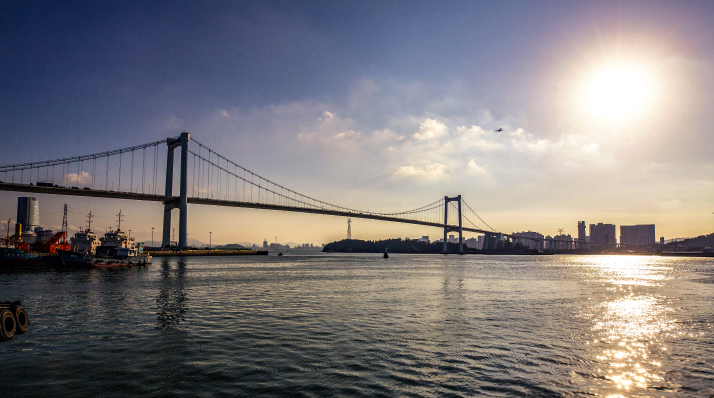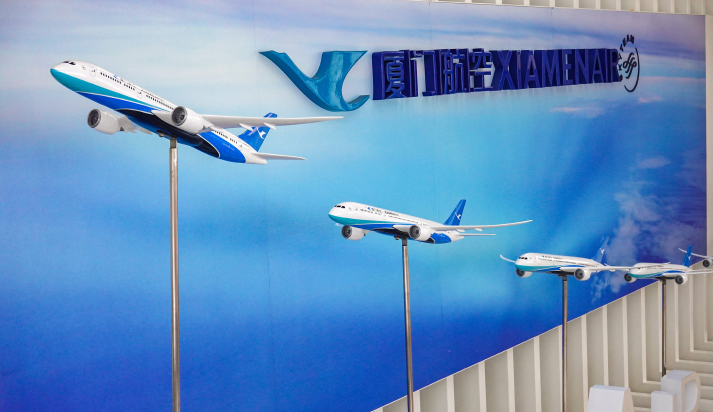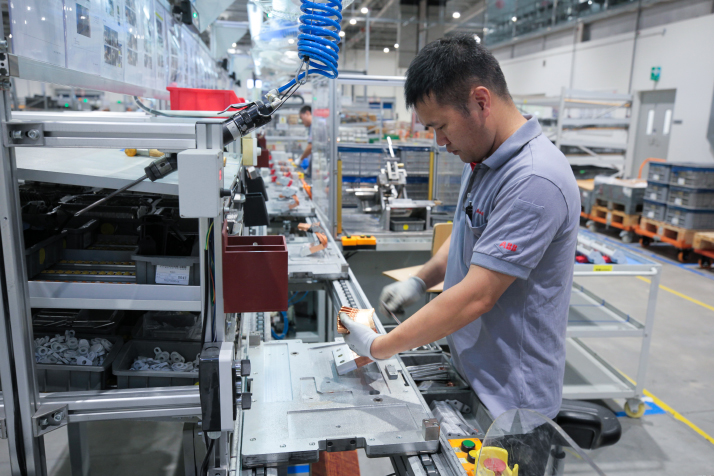| NO. 43 OCT 24, 2019 |
| Gateway to Growth | |
| Pioneer Xiamen Special Economic Zone's success exemplifies Chinese persevering spirit | |
|
|
 An evening view of Xiamen City, Fujian Province, on September 19, 2018 (WANG XIANG)
When William N. Brown sat near Tiananmen Square in Beijing, watching the spectacular celebration of the 70th anniversary of the founding of the People's Republic of China on October 1, it struck a special chord in his heart, he said. The U.S. professor at Xiamen University in southeast China's Fujian Province has a unique view of China's rise, especially the development of the port city of Xiamen. Being the first foreigner to be given permanent residence there in 1992, he also has a link to the man who charted Xiamen's growth in the 1980s —President Xi Jinping. Brown moved to Xiamen with his family in 1988, three years after Xi had assumed his new post as vice mayor of the island city. Finding China different from what he had thought and not correctly understood by the West, Brown started writing books about Xiamen and China to dispel the mistaken beliefs. He met the vice mayor at that time. "He is the one who encouraged me to write books [about China] 20 years ago," The 63-year-old Xiamen veteran said. "I hope through my books, people can know more and more about China." When his new book, Off the Wall: How We Fell for China, came out in January, Brown sent a copy to his old acquaintance, now the president of China. To his surprise—and pleasure—Xi wrote back to him after receiving the book. Xi called him an eyewitness to China's reform and opening up and appreciated his representing Xiamen and Fujian to the outside world and telling people stories of China. "Now, I am a Xiamen resident. I have witnessed the fast development of the city," Brown said.  Plane models displayed at the headquarters of XiamenAir, China's only airline company that has been making profits for 32 years in a row (WANG XIANG)
Farsighted blueprint Zhang Zhihong, Director of the Xiamen Development and Reform Commission, calls Xiamen one of the important fortresses of China's reform and opening up, its fast development epitomizing China's development. In August 1980, the State Council approved the establishment of special economic zones (SEZs) to further reform and opening up and provide suitable development models for the whole country. Subsequently, the first four SEZs were built in Shenzhen, Zhuhai and Shantou in Guangdong Province in south China as well as in Xiamen. In 1985, the 2.5-square-km Xiamen SEZ was expanded to encompass the whole island, an area of 131 square km. Since there was no existing development experience for the newly established SEZ, Xi came to Xiamen to pioneer the reform and opening-up campaign, as he told Xiamen Daily in 2016. "While working in Xiamen, Xi encouraged the pioneering spirit; actually, he was doing that himself," Zhang told Beijing Review. According to her, soon after Xi's arrival in Xiamen, he led the work of drafting the Xiamen Economic and Social Development Strategy (1985-2000), the city's first mid- and long-term blueprint for development. "He made very detailed plans to develop Xiamen from a bonded area into a free trade area and then into a free port-based SEZ," she said. "This was a very farsighted plan, when we see it today." Cross-island development Xi kept Xiamen's development in mind even after he left the city in 1988. In 2002, when he was governor of Fujian, he came back to Xiamen and put forward a development strategy: upgrading the island while promoting cross-island development. According to him, the island had matured and had little room for companies to expand their operations, but the districts outside it, such as Tongan and Xiang'an, still had huge development space and potential and should be tapped. "Seventeen years have passed since Xiamen adopted the cross-island development strategy. Every step of our development shows Xi's deep affection for Xiamen and high expectations," Zhang said. The infrastructure was improved to realize cross-island development, with four bridges and a tunnel connecting the island with the surrounding districts. In addition, all the five subway lines, both the operational ones and those under construction, lead outside the island. A new airport has also been approved in Xiang'an, estimated to be completed in 2023. In 2010, Xi came to Xiamen to attend the 14th China International Fair for Investment and Trade. He was then vice president of China. He acknowledged the progress the city had made in cross-island development. "Based on the achievement, Xiamen put forward the strategy of promoting integrated development across the whole city," Zhang said. When he came again in September 2017, Xi was president of China and the occasion was the BRICS Summit. In his speech at the opening ceremony of the BRICS Business Forum on September 3 that year, Xi recalled his experience of working in the city and lauded the city's fast development in all aspects. "On a personal note, Xiamen is where I started off when I came to Fujian to take up a new post in 1985. Back then, being one of the earliest SEZs in China, the city was at the forefront of China's reform and opening-up endeavor and was brimming with development opportunities," he said. "Three decades later, Xiamen has become well known for its innovation and entrepreneurship, with burgeoning new economic forms and new industries, robust trade and investment, and easy access to the world with air, land and sea links. Today, Xiamen is a beautiful garden city with perfect harmony between man and nature." The cross-island development has seen Xiamen's economic development focus gradually moving outside the island. Seven out of the 12 industrial chains in the city valued at more than 100 billion yuan ($14 billion) each are located outside the island and they have led to the establishment of several industrial parks and brought in enterprises. The districts outside the island accounted for 49 percent of the city's total GDP in 2018, compared with 40.1 percent in 2002, and the proportion of fixed assets investment in these districts jumped from 42.5 percent to 75 percent during the same period. "President Xi fully endorsed the efforts of the Communist Party of China (CPC) Xiamen Municipal Committee and the Xiamen Municipal Government to implement the high-quality development concept in the past years," Zhang said. Beneficiary investor The cross-island development strategy has expanded Xiamen's development space and upped the opportunities for the companies based here. The Swedish-Swiss ABB Group, a multinational working in power and automation technology, is one of the beneficiaries. ABB's relationship with China dates back to 1907, when it delivered a steam boiler. It is also the first Fortune Global 500 company to start a joint venture in Xiamen, ABB Xiamen Switchgear Co. Ltd. established in 1992. "We chose Xiamen because of its unique business environment advantages," Allen He, Vice President of Hub BU Asia, Electrification Smart Power of ABB, told Beijing Review. "As an SEZ, it provides us with preferential policies and better infrastructure. More importantly, we have a lot of space to expand our operation." When the joint venture was started in Huli District on the island, it rented one and a half floor of a factory building. But with the expansion of its business in China, the factory became inadequate. In 1996, ABB Xiamen Switchgear built its own production base, the Xiaodongshan ABB Industrial Park, with an area of more than 30,000 square meters. Another round of expansion followed in 2007, but ABB still could not meet the market demand owing to the limited space. In 2014, it decided to move out of the island and the next year, supported by the local government, its larger production base, the ABB Xiamen Hub, started construction in Xiang'an. With an investment of $300 million and an area of 430,000 square meters, the hub became operational in 2018. It houses eight companies under ABB. "Previously, we had warehouses, offices and workshops in different places in Xiamen, both on and outside the island. Now we can put all our companies together for better industrial agglomeration effects," He said. ABB's factories in Zhangzhou, another city in Fujian, and Sihui and Shenzhen in Guangdong have also been relocated to the hub. Today, ABB has a full range of business activities in China, including research and development (R&D), manufacturing, sales and services. Its 44 companies with nearly 20,000 employees are located in over 130 cities. China is now ABB's second largest market with locally made products, solutions and services accounting for more than 90 percent of sales. ABB has invested more than $2.4 billion in China since 1992. In 2000, Xi visited ABB Xiamen Switchgear, urging it to focus on technological progress and quality control. Currently, Xiamen has become an important R&D center of ABB. In 2018, its patent applications increased by 28 percent. "Looking back, I can see that the decision to choose Xiamen as a gateway to enter the Chinese market was farsighted," He said. "Thanks to the past years' development in Xiamen, we have changed from a joint venture that only manufactured products to an influential R&D center of the whole group, and from a made-in-China company to a created-in-China center to serve the whole world."  Workers at the ABB Xiamen Hub in Xiang'an District of Xiamen on September 10 (WANG XIANG)
Gateway to reform In Chinese, Xiamen literally means "door to a high building." Xi reinforced the metaphor, calling Xiamen the "gateway of China's opening up" in a speech in June 1986, when he spoke about the construction of the Xiamen SEZ. To make the new SEZ better connected with the outside world, besides ground infrastructure, air connectivity also needed to be improved. "To further open up Xiamen to the outside world, it was necessary to have our own airline company," Lin Zhaoyang, Vice President of XiamenAir, told Beijing Review. XiamenAir was established in July 1984, making the city the first SEZ in China to have its own airline. It was a feat that couldn't have been achieved without Xi's initiative, Lin said. "Xi made substantial efforts to develop XiamenAir. Without his efforts, I don't think our company could have achieved what it has today," Lin said. Xi himself recalled the experience in 2015, during his state visit to the United States. There, he visited the Boeing assembly plant in Seattle, which was getting ready to deliver a Boeing 737 to XiamenAir, and it revived old memories. "In the initial stage, XiamenAir and the Xiamen Airport had to be developed with international loans, and the airline had only a few aircraft. Now, after 30 years of development, XiamenAir has the world's most advanced Boeing 787 planes. This is the epitome of China's civil aviation development," Xi said. Song Chengren, former Vice General Manager of XiamenAir, recalled that when XiamenAir was established, it had no office, no aircraft and no flight. "Xi went to Beijing several times, seeking the support of the Central Government, the air force and the Civil Aviation Administration of China," he said. Thanks to Xi's efforts, XiamenAir rented two Boeing 737s and operated its first flights. Today, it is a global company with 206 aircraft, more than 20,000 employees and nearly 350 flights, with an annual passenger capacity of 36 million. It is also the only airline in China to make profits for 32 years in a row. Lin described how when XiamenAir launched its maiden flight from Fuzhou, capital of Fujian, to Shenzhen in 1993, Xi, then Secretary of the CPC Fuzhou Municipal Committee, headed an official delegation on that flight. In April 2000, Xi, then Governor of Fujian, inspected XiamenAir and the Xiamen Airport to see how they were doing. During the inspection visit, he said XiamenAir's reputation stemmed from four factors: reform, its huge investment, high-quality services and people first. Six years later, when XiamenAir opened an office in Hangzhou City in Zhejiang Province, east China, Xi, who was then secretary of the CPC Zhejiang Provincial Committee, wrote a letter to the company, extending his congratulations. The airline has continued to grow from strength to strength. It marked another milestone on September 19 when it opened an office in Shanghai, its eighth branch office. "The Shanghai branch will focus on east China, especially the Yangtze River Delta region," XiamenAir President Zhao Dong said. "It will accelerate the company's expansion in east China and support the establishment of the Shanghai international aviation hub." Xiamen's growth, as Xi remarked at the BRICS Business Forum, reflected China's growth. "There is a popular saying here in south Fujian, 'Dedicate yourself and you will win,' which embodies an enterprising spirit," he said. "Xiamen's success is a good example demonstrating the perseverance of the 1.3 billion-plus Chinese people." (Reporting from Xiamen, Fujian Province) Copyedited by Sudeshna Sarkar Comments to niyanshuo@bjreview.com |
|
||||||||||||||||||||||||||||||
|